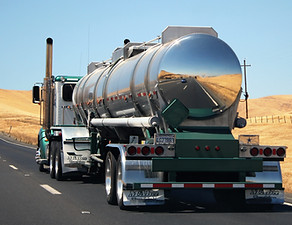
Liquid/Gas Cargoes
A very specialised trade, one which overlaps with the energy market. Cargo is very volatile, expensive, and expensive to carry. The environmental image of these carriers and cargo is extremely negative but the truth of the matter is more pollutants are poured down household sinks compared with accidents relating to this type of cargo.


Whilst major disasters are rare, claims are a cause of concern due to the high value.
Contamination
This is the presence of foreign particles that leads to the degrading of the product. The result could be the total loss of the product or simply the degrading of its value. The causes are generally:
-
Tanks not properly cleaned.
-
Shore tanks or pipes not properly cleaned or rusty.
-
Cross contamination at blending.
-
Water contamination.
It is therefore important to ensure:
-
Proper tank cleaning checks.
-
Proper shore tank and pipe checks.
-
Certification and/or surveys present.

Cargo insurance tends to cover contamination, but the perils can be limited or sometimes difficult to prove. Certain policies can widen coverage to "however so arising" and include "shore tank to shore tank" which gives much greater flexibility on coverage.
Shortage
This can be an annoyance for insurers because the cargoes are not susceptible to theft and during a pipe leakage can be quickly switched off. Insurers spend a lot of time and money dealing with paper losses and the headache is that it is costly to correctly cover.
Ullage is the amount by which a container falls short of being full. It is the unfilled space in the hull and since the vessel is constantly moving this does lead to different readings. Commonly the bill of lading will show a quantity loaded but after this has been discharged this may be quite different. Difference in temperature/density, water in tanks or simply different methods of calculation from origin to destination are often to blame.
Insurers often carry a deductible of 0.5% to avoid these situations but sometimes these losses are not so small, especially in less developed areas. This normally coincides with a Guaranteed Outturn (GOT) clause to be included in their policy that warrants the quantity on the bill of lading and outturn report is sufficient evidence.
It is recommended to use the same internationally recognised surveyors/certification agents with identical calculation methods to avoid any confusion in this area.
Flexitanks
Are a smaller way to transport liquids including oil. These are inflatable membranes that can fit inside a container. They can be carried on trucks and container ships in the same way and are therefore extremely versatile and provide extra protection.
The quality of flexitanks has greatly improved over the years and were initially a constant problem for carriers who often refused such shipments. These days they are becoming increasingly important for the simple reason often trade is one way and normal tanks need to be returned at a cost. Flexitanks can be disposed of or re-shipped in quantity back to origin.


Claims for flexitanks often arise from leaking or damage to third party equipment. A common cause is bulging of the container sides because of incorrect ullage which results in sloshing. Another is leaking and contamination of third-party cargo. Precautions should be taken at loading to prevent this:
-
Careful loading to its correct limits.
-
Container carefully checked for sharp objects such as nails.
-
Container is completely clean of residue from other cargoes.
-
Cams on doors are positioned correctly.
-
Labels carefully fitted.
-
Underside of the container checked. Nails may not be visible until loaded on top of another unit.
Insurance generally excludes leakages unless "sudden", but with the high clean-up costs its highly recommended to include a debris removal clause under the policy in case of loss. Liability insurance is highly recommended as well as considering the risks concerning third party damage.
